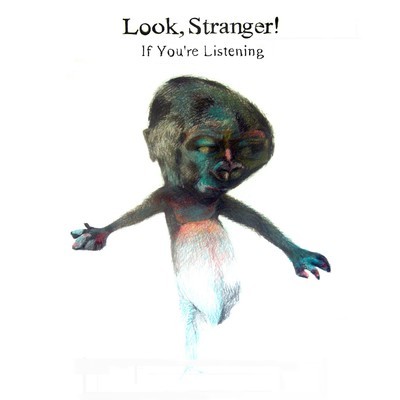Simon Reynolds’ Retromania: Pop Culture’s Addiction to its Own Past, and attendant articles both in The Guardian and The Quietus, have sparked a rush of debate. Indeed, it’s hard to believe that this all-encompassing phenomenon has received little media attention until now. Perhaps the wider truth is not just that ‘retromania’ fluctuates, but so does our sensitivity to it. Just trace its fortune from the time of Britpop, where retro was the dirtiest word – thrown at bands like Kula Shaker and Ocean Colour Scene – to the rehabilitation its received over the last ten years.
Look, Stranger! are a London four-piece whose debut E.P, If You’re Listening, is clearly indebted to the retro-rehabilitation of the hypnagogic trends of the last few years, but seems to be doing something quite other with them. For every wash of half-remembered 80s nostalgia, there’s a brazenly straight-up piece of production – like the snare raps that cut across stand out track ‘Look Around You’. It’s as if Ariel Pink and co opened up the doors for them, not to indulge in more post-modern posturing, but to unashamedly embrace the possibilities of a pop sound. And you can hear this in the excitement of the huge build-up at the end of the song, where China Crisis / Scritti Politti keys fight with a muted distorted guitar. I’m not sure that kind of guitar got rescued when people decided it was OK to like glossy synths, so it’s arresting to hear it employed here. If You’re Listening was recorded and mixed by drummer Thom Hosken in his attic, and while the production is both adept and intelligent, it’s this refusal to streamline and cherry-pick that really marks Look, Stranger! out as intriguing.
And this refusal is not only there in stylistic terms, but also in terms of the song writing and the playing, which are simply too individualistic to tow any line. It’s these contradictions which ultimately make it sound not like something inspired by the 80’s, but something from the 80’s, when these battles with technology were being fought for the first time, which is both odd and interesting. Final track, ‘Wade Out’, takes this to a beautiful conclusion, as it balances the glossy guitars of Aztec Camera against a song that twists and turns, frequently returning to the image of someone on a beach beside their clothes. With odd, drifting rhythms, unexpected melodic changes, and dark harmonies, the song writing is reminiscent of Roddy Frame’s or Paddy McAloon’s most jazzy sophistipop cuts. It’s also irreducible to a mere stylistic game, because there’s real heart in there.



